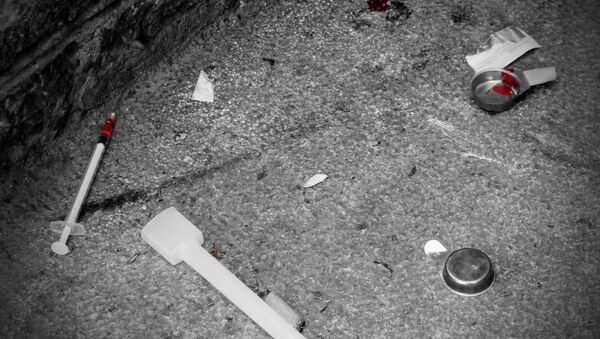"If it weren’t for me, you wouldn’t be talking about illegal immigration," he said during the first GOP primary debate.
The business mogul is now leading in the polls, and it seems his anti-immigration rhetoric is not only loud and clear, but is also gaining widespread support.
Enter a recent article published by the Washington Post, examining the cost and prevalence of heroin in the US. According to the article’s author, Lenny Bernstein, heroin has become the latest drug epidemic in the country because of its incredibly low prices which, he found, was as cheap, if not cheaper, than a pack of cigarettes.
These low prices, Bernstein further contends, are the result of a "concerted action on the part of Mexican drug cartels," which have "dramatically increased production" to expand their market in the country.
While there may be some merit to linking the low price of drugs to their increased demand, Bernstein’s assessment appears to be based entirely on information provided by a single source: DEA Agent Joseph Moses.
"The rise of the Mexican trafficking organizations and [their] push to heroin has kept the price where it’s at," Moses is quoted as saying in the article.
This tenuous link between Mexican drug cartels and heroin prices in the US is "simply irresponsible," according to activist and Union Del Barrio member Ron Gochez.
Gochez explained that there are many factors contributing to the drug trade in the US, noting that pushing a link to Mexican drug cartels alone is not only incorrect, but it also reflects a complete lack of research.
"First, why is there an influx of drugs in the country? Because there is an American demand," Gochez, who is also a high school teacher, told Sputnik. "Even my students know that there can be no supply if there is no demand, and the US is the number one country in the world in terms of consumption of drugs."
The other parties responsible for the promulgation of drugs in the US, Gochez adds, are none other than the American government and the DEA itself.
"The DEA is just as involved in the drug trade as anyone else in the world," he said, adding that by cutting drug rehabilitation programs and "feeding the prison industrial complex," the drug crisis is "being fueled directly by the US."
Noting the failed efforts of the DEA in the so-called War on Drugs, Gochez added that he trusts the "Mexican drug cartels as much as the US government in battling drugs."
Far from accurately representing the networks involved in the drug trade and the complexities inherent therein, the Post article, Gochez suggests, merely “fans the flames of hatred.” For the general American public, he said, Mexican people in general become the perpetrators by default.
In line with Trump’s "outlandish" claims about immigration, Gochez noted that the dialogue on drugs has become "part of a process of criminalizing an entire people for a political purpose."
"I don’t think Trump is going to win," the activist said. "But regardless of whether or not he does, he is pushing the Republicans further to the right by building a climate of anti-immigrant, and specifically anti-Mexican, hate."





